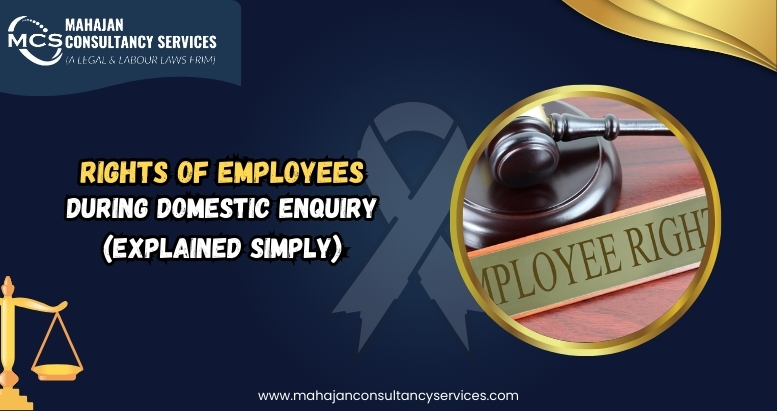Domestic Enquiry is a formal process conducted by employers in India to investigate allegations of employee misconduct. While it is a tool for employers to uphold discipline and organizational policies, employees also have certain rights to ensure that the process is fair, transparent, and legally compliant.
Understanding these rights is essential for employees to protect themselves and ensure that their side of the story is heard. Mahajan Consultancy, with its expertise in corporate legal services, helps employees and organizations navigate Domestic Enquiry proceedings smoothly while respecting legal standards.
Right to Receive a Show Cause Notice
Before any Domestic Enquiry can begin, an employee has the right to receive a clear show cause notice. This notice must:
- Specify the alleged misconduct
- Reference relevant company rules or policies
- Indicate the potential consequences
- Provide details of the enquiry date, time, and venue
Receiving this notice is a fundamental right and ensures that employees are aware of the charges and can prepare their defense.
Right to Be Heard
Employees have the right to present their side of the story during Domestic Enquiry. This includes:
- Responding to allegations
- Presenting evidence, documents, and explanations
- Questioning or cross-examining witnesses
This right is grounded in the principle of natural justice and ensures that the enquiry is fair and unbiased. Mahajan Consultancy advises employees on how to effectively exercise this right while maintaining professionalism.
Right to Representation
Employees have the right to legal or union representation, particularly if they are unionized, senior staff, or facing serious allegations. A representative can:
- Assist in understanding the allegations
- Help present evidence and arguments
- Ensure procedural fairness
Employers are legally obligated to allow representation where applicable. Denying this right can lead to challenges in labor courts.
Right to Know the Evidence Against Them
Employees have the right to know the evidence and witness statements that the employer will rely on during the enquiry. This includes:
- Copies of written statements
- Any documents or records used as evidence
- Reports or findings relevant to the case
Access to evidence ensures that employees can prepare an effective defense and prevents surprises during the hearing.
Right to a Fair and Impartial Enquiry Officer
Employees are entitled to a fair and impartial Enquiry Officer who has no conflicts of interest. The officer should:
- Conduct proceedings objectively
- Evaluate evidence without bias
- Avoid influence from management or colleagues
An impartial officer ensures that the Domestic Enquiry is legally compliant and protects the rights of the employee.
Right to Confidentiality
Employees have the right to confidentiality during the Domestic Enquiry. Employers should limit disclosure of allegations and evidence to relevant parties only. Breaches of confidentiality can harm the employee’s reputation and may be considered a violation of their rights.
Right to Present Witnesses
Employees can call their own witnesses to support their case. Witnesses can provide testimony, evidence, or clarification that may counter allegations. Mahajan Consultancy advises employees to carefully select witnesses who can provide credible and relevant information.
Right to Raise Objections
Employees have the right to raise objections if they believe the proceedings are unfair, biased, or violating legal procedures. Common objections include:
- Biased Enquiry Officer
- Procedural lapses
- Insufficient time to respond to allegations
Raising objections formally ensures that concerns are documented and addressed, maintaining procedural fairness.
Right to Written Communication of the Decision
After the enquiry, employees have the right to receive the decision in writing, detailing:
- Findings of the Enquiry Officer
- Evidence considered
- Reasons for the disciplinary action
- Applicable policies and rules
A written decision provides clarity, documentation, and grounds for appeal if the employee believes the outcome is unjust.
Right to Appeal
If the outcome of the Domestic Enquiry is unfavorable, employees generally have the right to appeal within the organization or to labor authorities. This may include:
- Internal appeal to higher management
- Filing complaints with labor tribunals or courts
Understanding the appeals process is critical for employees who feel that the enquiry was conducted unfairly.
Conclusion
Domestic Enquiry is an important mechanism for maintaining workplace discipline, but it must be conducted fairly and transparently. Employees in India have clear rights during this process, including receiving a show cause notice, being heard, representation, access to evidence, confidentiality, impartial proceedings, presenting witnesses, raising objections, receiving written decisions, and appealing outcomes.
Mahajan Consultancy provides guidance to both employers and employees, ensuring that Domestic Enquiry proceedings are fair, legally compliant, and well-documented. With professional support, employees can confidently exercise their rights, and employers can conduct enquiries without risk of legal challenges.
FAQs
- What is the first right of an employee in Domestic Enquiry?
The first right is to receive a clear and detailed show cause notice specifying the allegations and potential consequences. - Can employees present evidence during the enquiry?
Yes, employees have the right to present documents, witness statements, and other evidence supporting their defense. - Do employees have the right to legal representation?
Yes, particularly for unionized staff or serious allegations, employees can have legal or union representation. - What is the right to know evidence against them?
Employees have the right to access all evidence and witness statements that the employer will rely on during the enquiry. - Can an employee challenge the Enquiry Officer?
Yes, if the officer is biased or conflicted, employees can raise objections to ensure a fair enquiry. - Are employees entitled to confidentiality during the enquiry?
Yes, employers must maintain confidentiality and limit the sharing of information to relevant parties only. - Can employees call witnesses in their defense?
Yes, employees can present witnesses who provide relevant testimony or evidence supporting their case. - Is a written decision mandatory?
Yes, employees have the right to receive a written communication of the enquiry outcome and reasoning behind the decision. - Can employees appeal an unfavorable outcome?
Yes, employees can appeal internally or to labor authorities if they believe the enquiry was unfair. - 10. How does Mahajan Consultancy help employees during Domestic Enquiry?
Mahajan Consultancy guides employees in understanding their rights, preparing responses, representation, and ensuring the process is fair and legally compliant.




